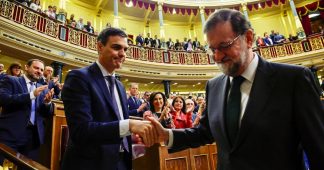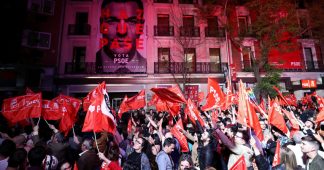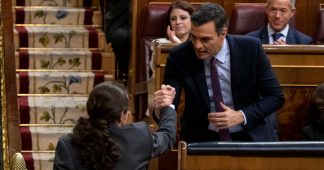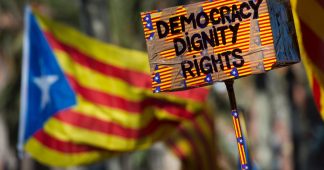The PSOE-Podemos coalition promises to roll back recent attacks on labor rights and provide a negotiated solution to the Catalan crisis. But the new government’s moderate tone hasn’t placated the business and institutional establishment — and they’re already working to thwart its plans.
By Jaime Pastor
Translation by Todd Chretien
Jan.14, 2020
There is also a crisis on the institutional front. The judiciary has acted as a “government of the judges,” there is a crisis of political representation, and more and more people are questioning the role of the monarchy. And on the national-territorial front, the Catalan movement has challenged the central government’s rule, while simultaneously shedding light on a depopulation crisis known as España vaciada (“empty Spain”).
Uncertainties abound as to how long this unprecedented PSOE-UP coalition can last. Yet the pact was concluded after two elections that did not give any party or parties the votes to form a stable government. Further complicating matters, the PSOE-UP accord relies on agreements with other political forces, including affirmative confidence votes by the Basque Nationalist Party (PNV), the Galician Nationalist Bloc (BNG), More Country (Más País), Commitment Coalition (Coalició Compromis), and Teruel Exists (a small regional party), while counting on abstentions from the Republican Left of Catalonia (ERC) and Basque Country Unite (Euskal Herria Bildu).
Complicated Alliances
Of all these agreements, the one with ERC is by far the most important. It commits the government to the short-term establishment of a Roundtable for Dialogue to address the “political conflict” between the Spanish and Catalan governments. It will consider a possible agreement, culminating in a consultative referendum on Catalonia’s future status. In other words, it is a process whose result is yet to be defined and which has a necessary built-in ambiguity with regard to both its legal framework and the exact path to be taken.
The document signed with the PNV is likewise important, reinforcing the need to address the pluri-national reality of the Spanish state. It also obliges the central government to consult with the PNV on decisions concerning the Basque country, especially in fiscal matters (and it should not be forgotten that the PNV is a conservative party, although one without family relation to Franco’s fascist regime).
All these agreements can be characterized as social-liberal, complying with Brussels’s economic diktats in economic terms and reformist in terms of national-territorial questions. Despite this, over recent days a growing alarm has taken over most of Spanish establishment.
Establishment Alarm
This sense of alarm was reflected in the parliamentary debate over the PSOE-UP coalition government’s investiture. It is especially apparent in the belligerence of the three right-wing parties — the mainstream-conservative People’s Party (PP), the right-populist Ciudadanos, and the far-right Vox.
This jockeying for position on the Right — as each party seeks to take credit for most loudly denouncing the impending catastrophe and national betrayal to be brought on by Sánchez — was intensified by the election result itself. In November’s general election, the far-right Vox placed third in the national vote, winning 15 percent, behind only the PP and PSOE.
The reaction against the new government has been on display on many fronts: from most of the media to the Episcopal Conference of Bishops (“pray for Spain”) to large corporations and, above all, the judiciary and even administrative bodies such as the Central Electoral Board (JEC).
These forces have made direct political interventions. On the eve of the parliamentary investiture debate, the JEC decided by seven votes to six to disqualify the president of the Catalan government, Joaquim Torra, from the vote. He was convicted of disobeying an order to remove a banner calling for freedom for Catalan prisoners. The JEC next demanded that ERC leader Oriol Junqueras be kept in prison, despite a ruling to the contrary issued by the European Court of Justice, and indeed a communication from the European Parliament which definitively recognizes Junqueras, together with Catalan politicians Carles Puigdemont and Toni Comín, as MEPs (Members of the European Parliament).
The fact that PP leader Pablo Casado was the first to disseminate the resolution regarding Torra clearly confirms his party’s complicity with the majority on the JEC. They joined together in trying to create a last-minute obstacle to the ERC’s possibly decisive vote in the investiture debate.
Once Again, the Union Sacrée of Spain and … ETA
The Right has widely criticized the moderate socioeconomic measures announced thus far (a partial repeal of the PP’s neoliberal labor reforms, an increase in the minimum wage, increases in some direct taxes on wealth, etc.) and served up inevitable references to Hugo Chávez’s Venezuela and the anticipated appointment of populist and communist ministers. But the main target of their diatribes against the PSOE leader has been his agreements with nationalist and independentist forces (mainly the ERC but also EH Bildu).
Using Sánchez’s own openly anti-Catalan independence discourse (on full display during the last campaign), the Right accuses him of being a “traitor” to Spain and the Constitution. PP leader Casado has warned of a “Frankenstein government nightmare,” “Spain breaking with constitutional socialism,” and of “violations of national sovereignty.”
Vox MP Santiago Abascal has echoed Casado. He added his own well-known attacks on feminism, environmentalism, and immigration, tracing these supposed transgressions to the PSOE’s history in the lead-up to the Civil War and denouncing the new governmental agreement as a “coup.”
Meanwhile, Teruel Exists’ sole MP was subjected to a hostile social media campaign and attacks in his home province, putting him in the list of “traitors to the country” for his willingness to vote in favor of Sánchez’s investiture.
After these interventions, there was little left for Ciudadanos’s leadership to add (with this right-populist party mired in rapid electoral decline) beyond denouncing the “ideological counter-reform” in education. Ciudadanos has continued with its paranoid criticism of all [regional-]nationalist forces as “not Spanish,” calling on PSOE members to switch parties.
However, when the spokeswoman for the Basque EH Bildu party criticized King Felipe VI for his [anti-Catalan independency] speech on October 3, 2017, the Right’s particularly crass conception of freedom of expression was exposed, as was their nostalgia for Basque Homeland and Liberty (ETA — formally dissolved in May 2018). The existence of ETA was, indeed, useful to the Right in criminalizing the Abertzale (Basque nationalist) left and accusing Sánchez of being an accomplice of terrorism.
Changed Attitudes
In response to these provocative speeches, the Socialist leader has avoided any explanation of his changed attitude, reflected in the agreement he reached with UP and ERC. Sánchez has limited himself to arguing that, in the face of stonewalling by the three right-wing parties, concluding such agreements with the Left and the nationalists was the only alternative to a third election. He has also tried to play down the scope of the document signed with ERC, making it clear that he is seeking a solution “within the framework of the Constitution” and that he continues to reject the right of self-determination.
In the context of this polarization, Podemos leader (and now deputy prime minister) Pablo Iglesias sought both to raise hopes and defend his role in the negotiations, referring demagogically to social movements as “architects of the Agreement” and pointing to the struggle for social justice as an alternative to the extreme right and to pluri-national Spain as against the “anti-Spain” Vox.
However, Iglesias failed to acknowledge the parts of UP’s electoral program he was forced to relinquish in order to accept the limits established in the new government’s program. It was left to ERC spokesman, Gabriel Rufián, to speak directly to Pedro Sánchez’s past contradictions. He cited Argentine writer Jorge Luis Borges to remind the new prime minister “no nos une el amor sino el espanto” (“it is not love that unites us but horror”), facing a common enemy in a “feral right wing.” He warned that “if there are no negotiations, there will be no [government lasting a whole] legislature.”
Only Mireia Vehí of the Popular Unity Candidacy (CUP) offered a left-wing criticism of the coalition government’s program, denouncing the continuation of tragedies such as those on Spain’s southern coast and in the foreign detention centers (CIES). She reminded the PSOE that it had once defended “the right of self-determination of all Iberian nationalities” during the end of the Franco era.
The Right has insistently rejected the right to criticize Felipe VI in any manner, denounced of the “socialist surrender” to the [regional] nationalists. It has also vehemently attacked Catalan MP Montserrat Bassa’s demand for the release of her sister — imprisoned Catalan Counselor for Labor, Social Affairs, and Families Dolors Bassa — and the other Catalan political and social representatives who remain in jail.
Faced with this, EH Bildu MP Oskar Matute made a timely reference the French revolutionary socialist Daniel Bensaïd. As Bensaïd put it, taking stock of his organizing history, “We have sometimes, even often, been wrong, and on quite a few things. At least we have not made a mistake either in combat or in enemies.”
Obstacles on a Narrow Road
We are thus entering a new phase, in which Sánchez’s investiture does not in the least guarantee the governability of a regime which faces a structural crisis — not only at the state level but across the European Union as a whole.
The maximum to which the government aspires is to offset part of the neoliberal cuts to social services and rights carried out in the recent past. Yet even these reforms are conceived of as operating within restrictions imposed by Article 135 of the Constitution (requiring a balanced budget). The European Commission has already referred to this as it mandates an €8 billion budget reduction.
The government hopes to compensate for this with a tax reform that will not even meet the European average. But above all, it seeks to compensate with progressive measures on other fronts such as civil rights and civil liberties (repealing gag laws, legalizing euthanasia, legitimizing historical memories of the Franco era, taking measures against macho violence, etc.), a timid energy transition, and the will to “channel” the Catalan conflict through dialogue.
However, despite the restraint Sánchez has reaffirmed in recent speeches, the fundamental problem he faces will be the opposition from a Right of mostly Francoite origins.
This explains his fear that an even partial reform of one of the Right’s untouchable dogmas — the unity of Spain, understood as a single nation within inviolable border — may open the Pandora’s box of constitutional reform. This could even risk sparking a constituent process in which the fundamental pillars of the regime, such as the monarchy and the authoritarian enclaves inherited from the dictatorship, are challenged.
Even a seemingly moderate right-wing columnist, José Antonio Zarzalejos, has compared Sánchez’s alliance with [regional-]nationalist forces to the 1930 San Sebastián Pact, which preceded the fall of the monarchy and the proclamation of the Republic in April 1931. If only that were the case.
Unfortunately, the new government has no intention of generating a scenario that might lead to a rupture like the one that started back then. Rather, the new government aims to mitigate political instability — despite a crisis in Spanish governance that will undoubtedly continue unabated.
So, despite this new government’s moderation, we must prepare to respond to the reactionary bloc’s professed strategy of heightening tensions — a strategy it is rapidly learning from the new form of constitutional coup recently spreading in Latin America. We have already seen them apply this conception of “illegitimate” government in their attempt to disqualify the president of the Catalan Generalitat. And thus, we return to the old discussion about legality and legitimacy, a discourse resuscitated in the wake of the Catalan conflict which all three right-wing parties are now resurrecting for their own purposes. The Right has tried this before — for instance, in the wake of the Madrid train bombings in 2004, PP prime minister José María Aznar initially tried to pin blame on ETA, leading to popular outrage and the PSOE’s victory in the subsequent elections.
Left Alternative?
Given this polarized framework and the radicalization of the Right, in the short term at least it is hard to see how the PSOE could align its current agreements [with Podemos and regional nationalists] with other possible pacts with the PP or Ciudadanos on the big questions of state. Yet there is no doubt the Socialist leaders will try to do this when the turbulence has calmed. This government will soon also have to respond to the threat of war that Trump has stirred in the Middle East — and the US military will no doubt again want to use the Spanish Naval Station Rota. We will have to demand that Sánchez says No to War, just as we did when Bush, Blair, and Aznar dragged us into war in 2003.
We should also consider Sánchez’s record of discursive and tactical about-turns (as well as pressures that he will come under within his own party, especially from regional PSOE strongmen) and the PSOE’s hegemony in the new government (Podemos has been handed none of the key ministries of state but its appointees are nonetheless obliged to act in a loyal and disciplined manner, including in parliamentary initiatives, according to the Follow-up Protocol signed by the two parties). So, we cannot have any confidence that this “coalition for progress” will firmly confront the reactionary bloc and the economic powers that sustain it.
It will be necessary to appeal, as is already being done with the mobilization of a general strike announced for January 30 in the Basque country, to the urgent need for a new cycle of struggles that fight for a social, ecological, feminist, anti-racist, and solidarity-based agenda among our peoples — struggles that go beyond the systemic limits that Sánchez himself will assume from day one. Further, we must not renounce our right to disobey any laws and or court rulings that attack our rights and freedoms, including the demand for freedom for political prisoners. This work must be accompanied — and promoted — by the reconstruction of a Left that is not subordinate to the new government, but rather reaffirms the need for a project of rupture with this regime and the rules of global neoliberalism.
Today, forces are emerging from the heart of the regime which are unwilling even to allow the timid reforms promised by the new government. Our response must be the building of a social bloc of the popular classes, determined to work toward the destruction of this regime. Faced with the threats that mark the onset of this new period, the answer isn’t for us to become more moderate — quite the opposite
Published at https://www.jacobinmag.com/2020/01/psoe-unidas-podemos-sanchez-vox-iglesias











